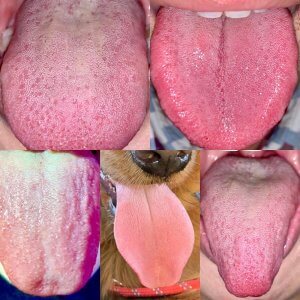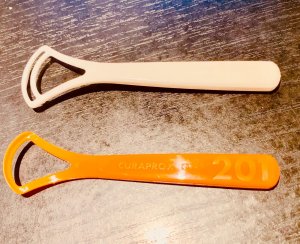Do I need to brush my tongue?
Most people are aware of the importance of tooth brushing and flossing, however not many people know about the equally important act of tongue brushing. Every morning and every night we brush our teeth, we floss regularly to get those bits in between, but we neglect to clean one of the biggest reservoirs of food and bacteria – our tongue. The human tongue is full of grooves and furrows that over the course of the day catch food particles. Although our saliva does a pretty good job of rinsing our tongue, it doesn’t always remove everything.
Why is brushing your tongue important?
If the tongue is not cleaned regularly, it develops a coating of food and microorganisms. This coating can cause various issues including bad breath, predisposition to infection, and an increased risk of periodontal disease. Manual cleaning of the tongue is associated with a reduction in tongue coating and fewer odorous sulphur compounds2.

How do you brush your tongue?
Tongue cleaning is very simple. A good time to clean your tongue is after brushing and flossing.
- Starting at the back of the tongue and working your way forward, use the bristles of your toothbrush to remove mucous and debris from the top surface of the tongue.
- A small amount of toothpaste can be used to clean the tongue; however, the mechanical action of brushing has the cleaning effect we’re looking for.
- Make sure to be gentle on the tongue as it is easily injured.
- Once tongue brushing is complete, follow with a rinse with some water.
What products are available for tongue brushing?
The easiest and most accessible way to clean your tongue is with your toothbrush – just make sure it’s a soft one! Another option is to use a two-in-one toothbrush with a tongue brush on the back of the head. Many well-known dental brands manufacture a range of toothbrushes with built-in tongue cleaners. There are also some tools on the market that have been specifically designed for tongue cleaning, such as tongue scrapers. Tongue scrapers are plastic or metal tools that function to remove bacteria and debris from the tongue surface. To use a tongue scraper, simply drag the tool gently from the back of the tongue to the front, rinsing out afterwards.

What can happen if you don’t brush your tongue?
If the tongue is not cleaned regularly, it can develop a thick bacterial coating, which over time leads to bad breath, also known as halitosis.
What is halitosis?
We’ve all had instances of bad breath in our lives. Whether it’s morning breath, following a spice-heavy meal, or simply too much garlic, bad breath is usually a normal part of life. The problem is when it lingers throughout the day for no apparent reason. If you’d like more information, check out this article on halitosis by Dr Will Wang.
What causes halitosis?
Halitosis can usually be sourced back to the proliferation of sulphur producing bacteria in the mouth. When we have food particles left behind in our mouth, particularly on the tongue, a coating of bacteria can develop. These specialized bacteria break down proteins and other food particles, leading to the release of foul-smelling sulphur compounds1. While this is the most common cause of bad breath, other factors that can also cause such odours include dry mouth, tooth decay, infections, and problems in the stomach or sinus.
There are many aspects of oral hygiene that, if lacking, can cause bad breath. In fact, it is estimated that 80-90% of all bad breath odours originate in the mouth1. Inadequate or infrequent brushing and flossing can result in food particles remaining in the oral cavity for extended periods of time. The breakdown of food, known as putrefaction, leads to the production of foul smelling odours2. Broken down or cracked teeth can also become reservoirs for food and bacteria and can make it more difficult for toothbrush bristles to adequately reach and clean between the gaps.
The best way to prevent halitosis is to keep on top of your oral hygiene, through regular tooth brushing, flossing and tongue brushing. In saying this, everyone’s mouth and oral needs are a little different, so the best person to give you personalised advice about your mouth will always be your dentist. If you need any advice relating to tongue cleaning, bad breath, or are simply due for your regular dental examination, get in touch with us on 07 3844 6071 or online!
References:
- Van der Sleen MI, Slot DE, Van Trijffel E, Winkel EG, Van der Weijden, GA. Effectiveness of mechanical tongue cleaning on breath odour and tongue coating: a systematic review. International Journal of Dental Hygiene [Internet]. 2010; 8: 258-268. DOI:10.1111/j.1601-5037.2010.00479.x
- Acar B, Berker E, Tan C, Ilarslan Y, Tekcicek M, Tezcan I. Effects of oral prophylaxis including tongue cleaning on halitosis and gingival inflammation in gingivitis patients – a randomized controlled clinical trial. Clinical Oral Investigations [Internet]. 2019; 23(4): 1829-1836. DOI: 10.1007/s00784-018-2617-5
About Our Author:
Sophie Dodson
Sophie began working at Highgate Hill Dental Centre in 2012 and has clocked up almost ten years experience in the dental industry working chairside with our dentists. After many years as a dental assistant, she moved into the role of Digital Content Creator for Highgate Hill Dental Centre whilst she completes medical school in Victoria.








